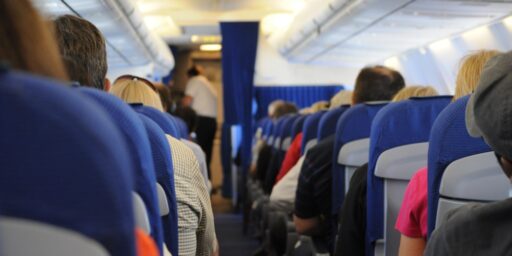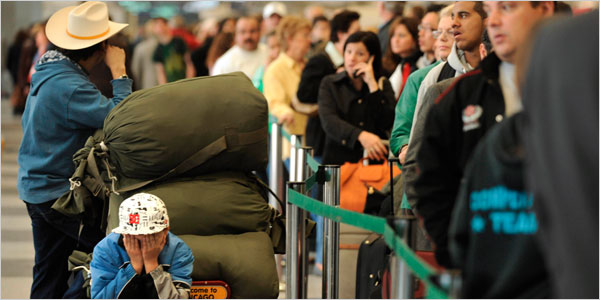Northwest Strike to Reshape Labor Relations
Northwest Airlines handled the first day of the strike by its mechanics virtually without incident, owing to a surfeit of unemployed mechanics and lack of support from other unions.
Northwest Weathers First Day Of Strike (WaPo, A1)
Northwest Airlines Corp. encountered picket lines and some flight delays as it weathered the first day of a strike by its 4,400 mechanics and maintenance workers.
The first major airline strike in seven years has set the stage for a confrontation that could reshape labor relations in a struggling industry. The airline unions, once a dominant force, have lost much of their power as their members have had to sacrifice wages and jobs repeatedly to keep the carriers afloat. With the industry in dire condition, the balance of power appears to be shifting away from organized labor to airline executives.
Northwest was able to maintain operations largely because its other labor groups, representing pilots, flight attendants and baggage handlers, ignored the strikers and reported to work. Airline officials claimed victory yesterday, saying 14 months of preparations for the walkout were paying off. They added that no further negotiations with the union were planned. “We’re predominately running on schedule,” said Andrew C. Roberts, Northwest’s vice president of operations. “We don’t expect any delays to increase, and our operations should improve over time.”
But smooth operations in the morning turned bumpy. A flight from Detroit to Boston scheduled to depart at 10:30 a.m. left at 4:39 p.m. because of mechanical problems. Another Detroit-to-Boston flight was delayed nearly an hour because of a problem loading luggage. A New York-to-Tokyo flight with a departure at 2:35 p.m. was rescheduled to leave at 5:30 p.m. because of an “aircraft change due to maintenance,” according to the airline. And four tires blew out on a jet landing in Detroit in what the airline described as a braking issue unrelated to the strike. No one was injured.
The disruptions were not on the scale of previous walkouts. In the past, sympathetic unions commonly sided with their fellow employees and launched slowdowns or strikes of their own. Now, many union workers prefer to preserve their jobs at lower wages than risk losing them through labor strife. In earlier days, airlines also risked an exodus of travelers reluctant to cross picket lines and concerned about disruptions to flight schedules, boosting the workers’ negotiating power. But those forces were not materializing yesterday.
[…]
Northwest prepared for the walkout by lining up 1,300 replacement mechanics, mostly workers laid off from other airlines who were willing to work for lower wages. It also arranged for lower-paid contract workers to perform other jobs such as aircraft cleaning.
Air travel is increasingly fraught with aggravations and delays, strike or no, so my guess is the few delays reported are unrelated to the strike.
The Northwest strikers seem to be in an even less advantageous bargaining position than the NHL hockey players. When one’s industry is losing money in massive quantities, threatening to withhold one’s services has substantially less impact than it would were it profitable. The fact that 1300 mechanics who had already been laid off jumped at the chance to work for the wages Northwest’s balked would seem like a good clue.






The line from the article that got me was , “The union said the airline wanted to slice the mechanics workforce in half by using more outside contractors and to cut the pay of remaining workers by 25 percent.” Perhaps just union scare tactics, but a 25% pay cut is rather significant.
I wonder why the collapsed Northwest 747 nose wheel in Guam wasn’t mentioned? Great pictures here – http://www.luchtzak.be/article9788.html Article here (and another picture) http://www.guampdn.com/apps/pbcs.dll/article?AID=/20050822/NEWS01/508220306/1002
Well, if the nose collapsed on a Friday and the strike did not happen until Saturday, I would say it was irrelevant to the strike. Unless you want to argue that the union’s mechanics screwed it all up.
Then again, I am not sure if the strike was on at the time in Guam (with the different time zones and all), so I cannot say for sure.
With the industry in dire condition, the balance of power appears to be shifting away from organized labor to airline executives.
Because we know *they* always have the right ideas (/snark)
Seriously, these are the same people who have looked askance at Herb Kelleher from Southwest for the past two decades and driven many carriers into the ground (cough, United, cough, Delta soon, cough).
AMFA failed to come close to assessing accurately their bargaining power in this dispute. In the last analysis, bargaining power is the only real weapon a union has.
Often a company can not adequately replace a striking work force. Like the railroads before them, the airlines have come to grips with technological change. The unions have not. Hence a bad miscalculation. Northwest will see this through because it must do so to survive. The handwriting is on the wall.
While Northwest management is enjoying their success so far, I would exercise more caution before I would say it is a complete success. The Northwest fleet is old and their aircraft require more maintenance than do newer aircraft. I think that it’s going to take several days before anyone knows that the strike is or is not successful for either side.
While I have some sympathy for the airline as well as the mechanics, I can tell you that both sides are most likely to blame for this strike. On the one hand, the mechanics are nothing more than dupes of the union, management has obviously had itself in a union busting mode for the past fourteen months.
It seem to me that the answer to end this strike lies with both the union and management to make the necessary changes in their operations and methods to settle things peacefully.
My fear is that as time goes on, poor maintenance practices will catch up and something bad will happen. No matter who you side with, aircraft maintenance is not just a matter for a bunch of part time mechanics or has been to be performing.
I have always admired the philosophy of Adolf Coors of Coors Brewery, That Unions are a result of Bad Management